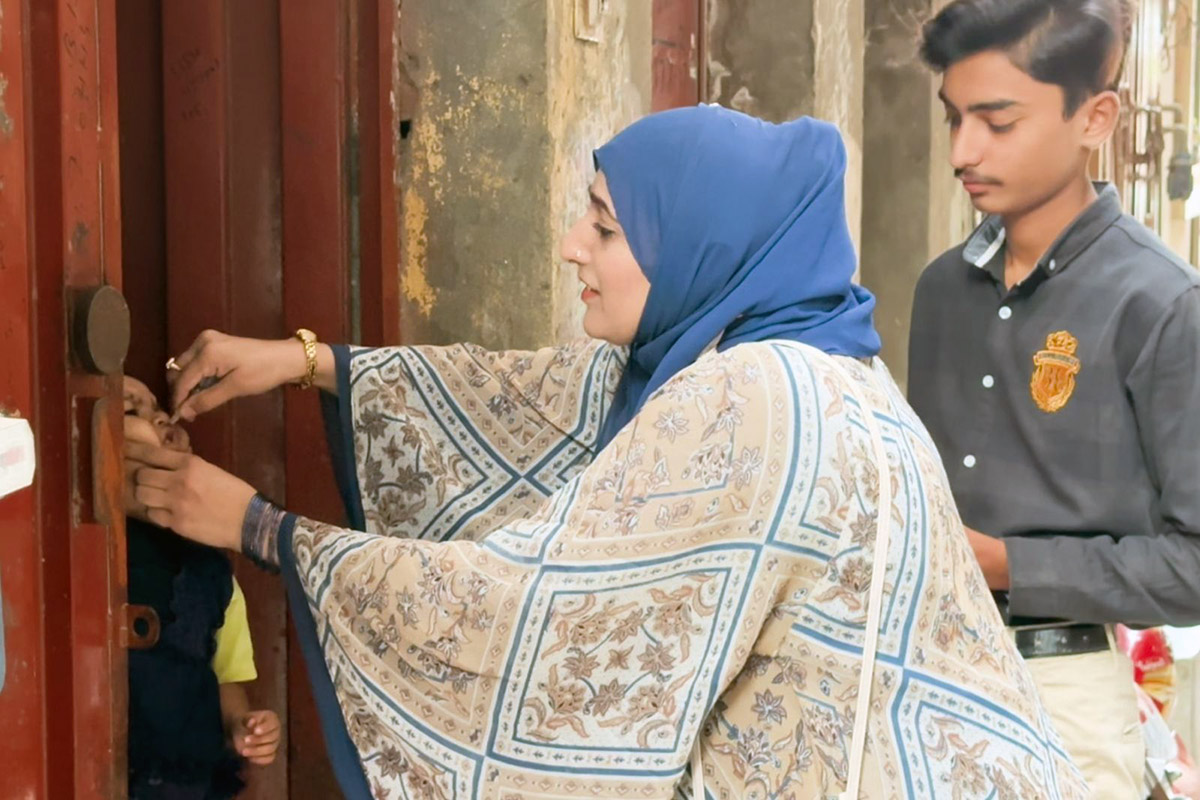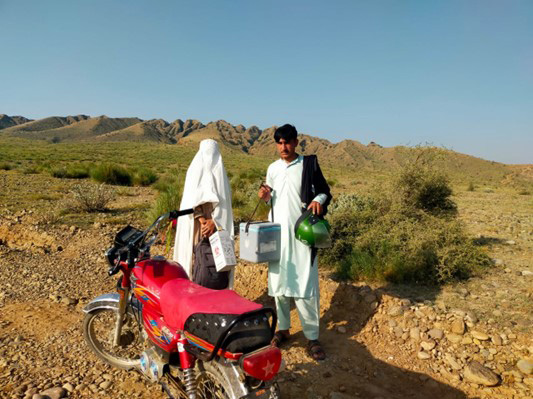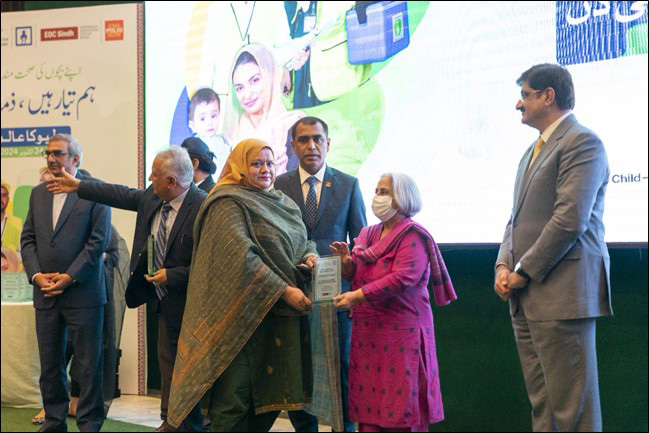 Ayesha Raza, a Pakistani polio survivor, administering polio drops during a vaccination campaign. Photo credit: NEOC Pakistan 23 April 2025, Islamabad, Pakistan – From vaccination campaigns to disease surveillance, women are at the forefront of the fight against polio across Pakistan, defying challenges, overcoming social norms, building trust and protecting the most vulnerable children from this lifelong paralytic disease. They are leading the way to run the last mile and end the global threat of polio.
Ayesha Raza, a Pakistani polio survivor, administering polio drops during a vaccination campaign. Photo credit: NEOC Pakistan 23 April 2025, Islamabad, Pakistan – From vaccination campaigns to disease surveillance, women are at the forefront of the fight against polio across Pakistan, defying challenges, overcoming social norms, building trust and protecting the most vulnerable children from this lifelong paralytic disease. They are leading the way to run the last mile and end the global threat of polio.
They are people like Ayesha Raza, a polio survivor who earned global recognition in 2024 for her dedication to fight this deadly disease, Bakht Roza and Basmina – who reach nomadic children in the harsh terrain of southern Khyber Pakhtunkhwa – and Dr Sarwat Wajahat Sheikh, whose efforts were recently recognized by the Government of Sindh.
Ayesha, the polio survivor protecting Pakistani children from disability
“It’s not easy for me to walk during polio campaigns due to my limited mobility, but I cannot miss the chance to bring hope and resilience to the children of Pakistan.”
Polio eradication is a personal mission for Ayesha Raza, a Pakistani polio survivor and health worker whose remarkable commitment earned her global recognition at the Golden Jubilee Ceremony of the Islamic Development Bank – a polio eradication donor – which took place in Saudi Arabia in 2024.
Every year, Ayesha is one of 400 000 vaccinators who go door-to-door to implement massive Government-led vaccination campaigns, supported by the World Health Organization (WHO) and partners, to protect over 45 million children against paralytic polio in Pakistan.
Ayesha was 2 years old when she contracted polio in the 1990s, at a time when Pakistan did not have a dedicated polio programme. Since then, vaccinators like Ayesha have reduced the number of polio cases by 99.7%. With her left leg paralyzed and difficulty walking, Ayesha’s childhood was challenging. But she refused to let disability define her. She turned to a career as a health worker and also volunteered for the Pakistan Polio Eradication Programme.
Ayesha works as a vaccinator and social mobilizer in Lahore, convincing hesitant parents to vaccinate their children to protect them from lifelong disability. “I eagerly await the day when polio is completely eradicated, bringing a brighter future for our nation and the world,” she says.
Brave women on motorbikes to reach nomad children
 Bakht Roza during a vaccination round in the remote area of Lakki Marwat. Photo credit: NEOC Pakistan. In the rough mountainous terrain of Lakki Marwat, two brave Pashtun women, Bakht Roza and Basmina navigate remote, security-compromised areas on motorbikes to vaccinate children against 12 deadly diseases, including polio. Working in Bettani subdivision, where health services are scarce, they are the sole source of essential immunization for children and expectant mothers.
Bakht Roza during a vaccination round in the remote area of Lakki Marwat. Photo credit: NEOC Pakistan. In the rough mountainous terrain of Lakki Marwat, two brave Pashtun women, Bakht Roza and Basmina navigate remote, security-compromised areas on motorbikes to vaccinate children against 12 deadly diseases, including polio. Working in Bettani subdivision, where health services are scarce, they are the sole source of essential immunization for children and expectant mothers.
Deployed under the Nomads Vaccination Initiative – launched in 2022 to vaccinate nomadic children who often miss polio and routine vaccinations due to frequent movement – Bakht Roza and Basmina travel long distances and overcome cultural barriers to protect children from terrible diseases. They have vaccinated nearly 2800 children, convinced over 200 refusal families to accept immunization, and administered tetanus vaccinations for pregnant women who had not received vaccinations at the local health facility because only a male vaccinator was available.
Braving harsh terrain, falls from bikes and community resistance, they remain steadfast. “We think of all the children in the community who need our help as our own children and that motivates us to keep going,” says Bakht Roza.
Their story is a testament to the resilience and dedication of female vaccinators who ensure that every child has the chance for a healthy future.
WHO Disease Surveillance Officer Recognized for Breakthrough Case Detection
 Left, Dr Sarwat Wajahat Sheikh receiving an award for her work. Right, Dr Sarwat during a vaccination campaign. Photo credit: NEOC Pakistan “As a public health worker, a polio-free Pakistan is my highest priority and a dream to realize.”
Left, Dr Sarwat Wajahat Sheikh receiving an award for her work. Right, Dr Sarwat during a vaccination campaign. Photo credit: NEOC Pakistan “As a public health worker, a polio-free Pakistan is my highest priority and a dream to realize.”
Making Pakistan polio-free is a priority for Dr Sarwat Wajahat Sheikh, a WHO Disease Surveillance Officer in Karachi’s Malir district. Her hard work and exceptional commitment to identifying and investigating polio cases in her district was recognized by the Government of Sindh on World Polio Day 2024.
In 2017, Dr Sarwat joined WHO in Sindh’s Dadu district where she played a key role in strengthening poliovirus and vaccine-preventable disease surveillance. In 2021, she was transferred to Karachi where the dense population, frequent migration and pockets of vaccine resistance, especially in underserved communities, make poliovirus circulation a persistent challenge. In Karachi Dr Sarwat contributed to expanding the number of surveillance sites from 43 to 93 and mobilized 152 community informants to improve polio case detection.
In 2024, she faced one of her toughest cases in Ibrahim Hyderi, a slum community of labourers and fishermen, where a child – suspected of having polio – had unfortunately passed away. The family was hesitant to cooperate with the Pakistan Polio Programme’s case investigation teams. Undeterred, Dr Sarwat spent weeks building trust with the parents, ultimately convincing them to let the teams collect stool samples from other children in the family to rule out polio.
Her efforts led to confirmation of the first polio case in the area in 10 years, triggering an urgent vaccination response to protect all children in the community. Dr Sarwat’s work earned her special recognition from the Government of Sindh. “Disease surveillance is a powerful tool to level the playing field, to bend the arc of our country away from poliovirus and towards a polio-free Pakistan”.




